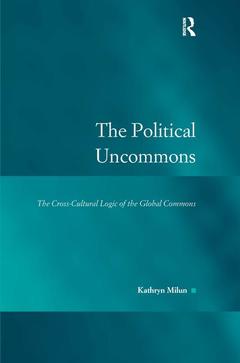The Political Uncommons The Cross-Cultural Logic of the Global Commons Law, Justice and Power Series
Auteur : Milun Kathryn

Date de parution : 01-2011
15.6x23.4 cm
Date de parution : 10-2018
15.6x23.4 cm
Thèmes de The Political Uncommons :
Mots-clés :
Global Commons; terra; Terra Nullius; nullius; Western Sahara; global; Epistemic Imaginary; epistemic; Nonstate Space; imaginary; Common Heritage Principle; international; Spatial Imaginary; law; Grotian Moment; spatial; Western Sahara Case; heritage; Non-State Space; principle; Political Uncommons; Grotius; Hugo Grotius; Interstate Space; Radio Frequency Spectrum; International Law; Space Law; Native Title; Seed Treaty; Spanish Sahara; Native Title Act; Exclusive Economic Zones; Ancient Commons; Sahrawi Identity; International Monetary Fund



